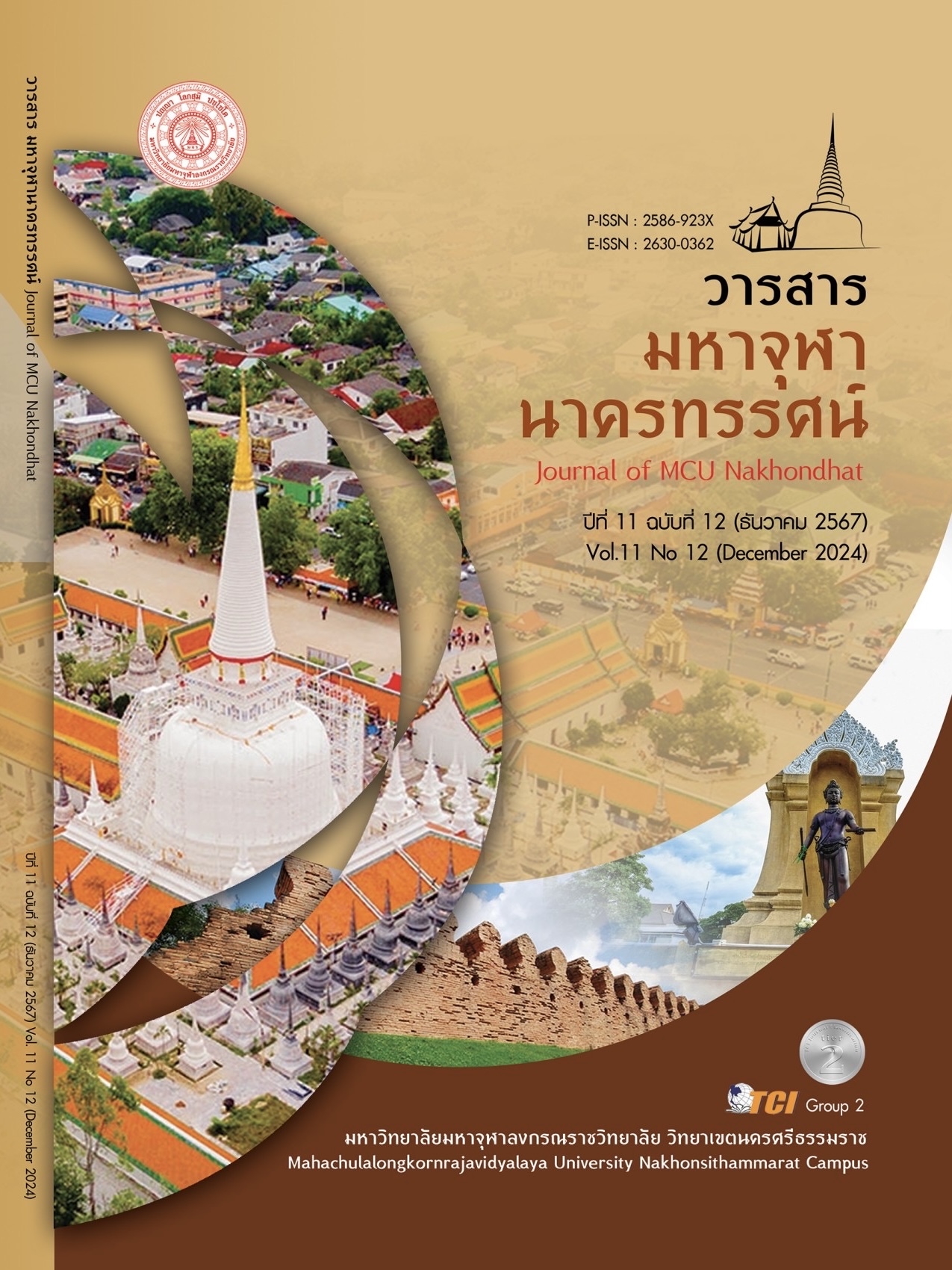THE QUALITY OF LIFE DEVELOPMENT BASE ON PANNA 3 OF PEOPLE IN MUANG DISTRICT, NAKHON SI THAMMARAT PROVINCE
Main Article Content
Abstract
This research article aims to study 1) The concepts and theories on quality of life development, 2) The Paññā 3 in Theravada Buddhism, and 3) Analyze the quality of life development with the Paññā 3 of people in Mueang District, Nakhon Si Thammarat Province. This is a qualitative research. The key informants are monks and people in Mueang District, Nakhon Si Thammarat Province, purposively selected, totaling 12 persons. The research instruments are in-depth interviews, data collection using in-depth interviews, and descriptive content analysis. The research results found that 1) The concept and theory of quality of life development is to develop the relationship of human intelligence to be complete in terms of body, mind, and intelligence. The framework of development is to develop oneself to be mindful and not careless, to be in good social behavior, to train the mind to be clear, and to develop intelligence to be a reasonable person to live happily in society. 2) Paññā 3 in Theravada Buddhism are Cintamaya-panya (wisdom that arises from thinking and considering), Sutamaya-panya (wisdom that arises from listening and studying), and Bhavana-panya (wisdom that arises from self-training). Applying the principles of Paññā 3 to develop a quality of life will enable people to live their lives according to their goals and achieve the desired results. and 3) The results of the analysis of quality of life development using the principles of 3 wisdoms of people in Mueang District, Nakhon Si Thammarat Province, enable people to apply them to their lives, to think and consider rationally, to listen to studies for living, to be mindful in daily life, and to train oneself to develop the mind, which will make life happy and allow them to know how to create happiness and be able to solve various problems effectively.
Article Details

This work is licensed under a Creative Commons Attribution-NonCommercial-NoDerivatives 4.0 International License.
References
ธีระ รุญเจริญ. (2550). ความเป็นมืออาชีพในการจัดและบริหารการศึกษายุคปฏิรูป. กรุงเทพมหานคร: สำนักพิมพ์ข้าวฟ่าง.
พระครูธรรมธรสุริยา อาภาโค. (25 มิ.ย. 2567). การพัฒนาคุณภาพชีวิตด้วยหลักปัญญา 3 ของประชาชนในอำเภอเมือง จังหวัดนครศรีธรรมราช. (พระภูวดล จนฺทสาโร (ปานนุ้ย), ผู้สัมภาษณ์)
พระปลัดวิริทธิ์พล อายุวฒฺโก. (26 มิ.ย. 2567). การพัฒนาคุณภาพชีวิตด้วยหลักปัญญา 3 ของประชาชนในอำเภอเมือง จังหวัดนครศรีธรรมราช. (พระภูวดล จนฺทสาโร (ปานนุ้ย), ผู้สัมภาษณ์)
พระพรหมคุณาภรณ์ (ป.อ.ปยุตฺโต). (2548). พจนานุกรมพุทธศาสตร์ฉบับประมวลธรรม. (พิมพ์ครั้งที่ 10). กรุงเทพมหานคร: เอส. อาร์. พริ้นติ้งแมสโปรดักส์.
พระไพศาล วิสาโล. (2546). หนังสือธรรมะ. ลำปาง: เมืองปานการพิมพ์.
พระมหาทัพยา ปิยวณฺโณ (แจ่มจำรัส). (2565). “กระบวนการพัฒนาปัญญาตามหลักวุฑฒิธรรม”. ใน ดุษฎีนิพนธ์พุทธศาสตรดุษฎีบัณฑิต สาขาวิชาพระไตรปิฎกศึกษา. มหาวิทยาลัยมหาจุฬาลงกรณราชวิทยาลัย.
ล้วน สายยศ และอังคณา สายยศ. (2540). เทคนิคการวิจัยทางการศึกษา. กรุงเทพมหานคร: สุวีริยาสาส์น.
สำนักนายกรัฐมนตรี. (2566). แผนพัฒนาเศรษฐกิจและสังคมแห่งชาติฯ ฉบับที่ 13 พ.ศ. 2566 - 2570. กรุงเทพมหานคร: สำนักงานสภาพัฒนาการเศรษฐกิจและสังคมแห่งชาติ.
อรทัย วลีวงศ์. (2563). การพัฒนาคุณภาพชีวิตที่ยั่งยืน ในเอกสารการประชุม. กรุงเทพมหานคร: สำนักงานพัฒนานโยบายสุขภาพระหว่างประเทศ (IHPP) องค์การอนามัยโลก.
อุดมศักดิ์ ณรงค์. (28 มิ.ย. 2567). การพัฒนาคุณภาพชีวิตด้วยหลักปัญญา 3 ของประชาชนในอำเภอเมือง จังหวัดนครศรีธรรมราช. (พระภูวดล จนฺทสาโร (ปานนุ้ย), ผู้สัมภาษณ์)


